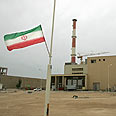
Nuclear facility Bushehr Iran
צילום: AFP
US report: Iran split on nuclear program
Four years after Washington determined Tehran halted effort to obtain nuclear weapons, updated intelligence report says Islamic Republic leaders at odds over whether to advance program due to sanctions
WASHINGTON - A new classified US intelligence report says Iran's leaders are locked in an increasingly heated dispute over whether to move further toward developing nuclear weapons, the Wall Street Journal reported
"The bottom line is that the intelligence community has concluded that there's an intense debate inside the Iranian regime on the question of whether or not to move toward a nuclear bomb," a US official was quoted by the American newspaper as saying.
"There's a strong sense that a number of Iranian regime officials know that the sanctions are having a serious effect."
According to the report, the new national intelligence estimate, or NIE, says Tehran likely has resumed work on nuclear-weapons research in addition to expanding its program to enrich uranium—updating a contested 2007 estimate that concluded the weapons program had all but halted in 2003.
However, the report doesn't conclude that Iran has relaunched a full-blown program to try to build bombs. According to the assessment, Iran's debate over whether to do so suggests international sanctions may be causing divisions in Tehran, US officials said.
The Wall Street Journal said the NIE's findings suggest that, in the US view, at least some Iranian leaders are worried that economic turmoil fueled in part by international sanctions could spur opposition to the regime—"though officials acknowledge it is impossible for outsiders to determine the precise effect of sanctions on decision-making in Tehran."
The report said that in a separate threat assessment presented to the Senate Intelligence Committee Wednesday, the director of national intelligence, James Clapper, said the US believes Iran should be capable of producing enough highly enriched uranium for a weapon "in the next few years," provided Tehran makes the decision to do so.
Clapper, in testimony to Congress, said the intelligence community believes Iran is "keeping open the option to develop nuclear weapons in part by developing various nuclear capabilities that better position it to produce such weapons, should it choose to do so. We do not know, however, if Iran will eventually decide to build nuclear weapons."
On Wednesday a group of US lawmakers unveiled legislation to toughen sanctions on Iran for its nuclear energy program, calling for international companies traded on US exchanges to reveal investments in the Islamic Republic.
"If we can bring greater transparency to any investment being made in Iran, we can defund the nuclear militarization of one of the world's most hostile nations," said Senator Kirsten Gillibrand, a New York Democrat who is one of the sponsors of the bill.
"Companies must make a choice: do business with Iran, or have access to the US economy... We have to have a zero tolerance policy for any company that puts profit ahead our safety or the safety of our allies."
The legislation was co-sponsored by Republican Senator Mark Kirk of Illinois, and in the House of Representatives by Ted Deutch, a Florida Democrat, and Dan Burton, a Republican from Indiana.
The bill would tighten sanctions already in place by Washington and the United Nations on Iran, which is suspected of using its nuclear program for illicit atomic weapons.
The lawmakers said the bill would require companies to disclose any sanctionable investments in Iran in their quarterly and annual reports to the Securities and Exchange Commission, and require US banks to report activities in Iran by their foreign correspondent banks.
AFP contributed to the report
- Follow Ynetnews on Facebook










